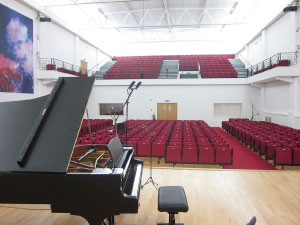In the midst of the not-quite-last part of a full, rich summer, I’m in the countryside along the English-Welsh border working on a recording project with my wonderful friends and colleagues, violist Geri Walther and cellist Andras Fejer of the Takács Quartet. We’re recording the Brahms Clarinet Trio (with the composer-sanctioned viola part in place of the clarinet) and the two Brahms sonatas for viola and piano (originally for clarinet as well). Our production team we are working with, Andrew Keener (producer) and Simon Eadon (engineer), make everything seem easy.
This is my second time working with this technical team and this venue (Wyastone Leys). The last project, two Beethoven violin sonatas with Ed Dusinberre (also of the Takács Quartet), was a great success in every way.
The role of the producer is interesting to me. We assume that classical musicians go into the studio, play through the music a few times; and, after a few magical edits, the project is done. While that describes the process at a simple level, the reality is more complex. The producer is part of the artistic team, helping to coax and cajole the best possible artistic result from the performer(s). Not only does he have to be attentive to obvious things like wrong notes or rhythms, out of tune moments and ensemble flaws, he also must be able to imagine the final result and make sure that all of the parts of a beautiful, musical performance are available for assembly into the final product. This requires someone with intrinsically musical and artistic expertise. And in a chamber music recording, the producer also has to be a teacher and a diplomat, able to gently steer the performers and handle the ever-changing interpersonal dynamics of the group.
 Andrew, our producer, is certainly one of the best in the recording industry, with vast experience working with soloists, chamber groups, and orchestras. With him, we know we are in good hands, and can trust his judgment on a wide range of issues technical and musical. I find myself always encouraged to do my best (to do better than perhaps I could have imagined), often in subtle ways. A wonderful and easy collaboration with my fellow musicians (“esteemed colleagues,” as our cellist Andras likes to say) is enhanced and deepened through Andrew’s thoughtful participation in the process. And Simon, our engineer, somehow captures the most beautiful sound imaginable! I am struck during playback by the warmth and presence that I am hearing—it is a kind of magic to think that the music sounds better on the playback than when you are playing it yourself!
Andrew, our producer, is certainly one of the best in the recording industry, with vast experience working with soloists, chamber groups, and orchestras. With him, we know we are in good hands, and can trust his judgment on a wide range of issues technical and musical. I find myself always encouraged to do my best (to do better than perhaps I could have imagined), often in subtle ways. A wonderful and easy collaboration with my fellow musicians (“esteemed colleagues,” as our cellist Andras likes to say) is enhanced and deepened through Andrew’s thoughtful participation in the process. And Simon, our engineer, somehow captures the most beautiful sound imaginable! I am struck during playback by the warmth and presence that I am hearing—it is a kind of magic to think that the music sounds better on the playback than when you are playing it yourself!
It’s the ambience of this beautiful and quiet countryside of the Wye Valley that completes the special experience of this project. Brahms was a composer who enjoyed his summers in the countryside, and one can’t help but think that he would have appreciated this place, where the loudest nighttime sounds are the bleating of the sheep behind the hotel. It is a pleasure to be able to explore the area on foot (running or walking) and enjoy the rolling hills of the Welsh borderlands.
